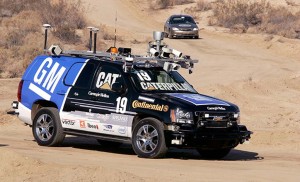
They're still the stuff of science fiction but development work on autonomous vehicles is proceeding fast.
After a late evening that included a few too many drinks the last thing you’re looking for is driving to work on a Monday morning. No problem. Just plug in your destination, close your eyes and let your autonomous vehicle drive to the office for you.
What has long been a science fiction fantasy is rapidly coming closer to reality – and a new study by J.D. Power and Associates finds many motorists – especially luxury buyers – intrigued by the prospect of buying an autonomous vehicle.
Perhaps that’s no surprise. In general, American car buyers are more and more interested in investing in the latest automotive technologies, according to a new study by J.D. Power and Associates.
While vehicle owners remain very interested in technologies that make their vehicle safer, they are turning their attention more and more toward features and technologies that allow them to be productive, connected and entertained while in their vehicles,” said Mike VanNieuwkuyk, Power’s executive director of global automotive.
One of the newest – and potentially most expensive technologies – is clearly polarizing. Depending on which group you ask, as many as four in ten motorists say they would like to buy an autonomous vehicle as their next car – were it available. That’s especially true among luxury buyers already used to paying a premium for the latest technologies.
Were price not an issue, 37% of all motorists say they’d like an autonomous car. Given a price tag of at least $3,000 more than a comparable, but otherwise conventional, vehicle, that slips to just 20%.
About a quarter of all male drivers would want such technology, and nearly a third of those between the ages of 18 and 37.
“Consumers are still learning about how autonomous driving technology could be used in their vehicles,” said VanNieuwkuyk. “Many owners are skeptical about releasing control of their vehicle and would like to see the technology proved out before they adopt it.”
Significantly, Power research shows that even those motorists who want an autonomous generally would prefer being able to shut that feature off. They’d want the option to hand over “boring” driving chores, such as the daily commute, going for a long highway drive, or having to hunt for a parking spot at the mall.
Technology, in general, has become a battleground in the auto industry, and VanNieuwkuyk suggests automakers will be “challenged” to find the right technology to attract consumers to their brands.
Power’s new Automotive Emerging Technologies Study is aimed at revealing the most popular technologies, which include:
- LED Headlamps, something 70% of those surveyed said they wanted;
- Natural language voice controls, named by 69% of respondents;
- Wireless connectivity systems, chosen by 68%;
- Remote vehicle diagnostics, chosen by 65%; and
- HD Radio, at a price of $100 picked by 52%.
Other popular technologies named in the study include enhanced collision avoidance systems, surround rearview cameras and personal assistance safety services.
